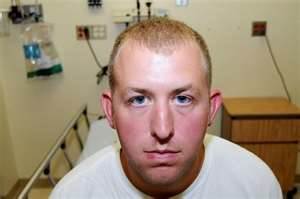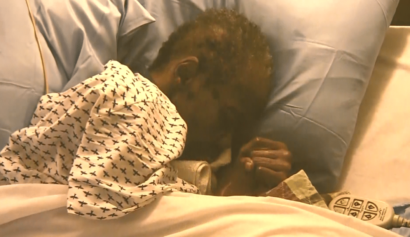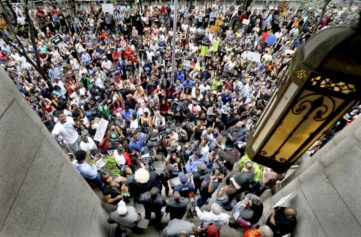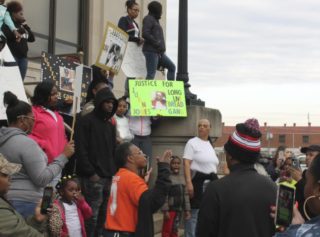Almost a year after the death of Michael Brown, former Ferguson Police Officer Darren Wilson has resurfaced in an interview with The New Yorker. The lengthy article by Jake Halpern tries to humanize Wilson and draw sympathy to his cause. However, the interview reveals Wilson is still largely clueless about race in America, and also still has stereotypical views about Black people.
One of the most troubling aspects about the article is that it reveals Wilson had no problem working for two police departments with histories of racism. Wilson got his start in law enforcement working for the Jennings Police Department, which had a long history of harassing Black people. One officer said towns like Jennings only paid officers about $10 per hour, so they don’t attract the best and brightest in law enforcement.
According to The New Yorker, when Wilson became a police officer in Jennings, he was joining a department that had a reputation for racism.
Wesley Bell, a newly elected member of the Ferguson City Council, stated in the article that he used to avoid driving through Jennings “like the plague,” and that the current mayor of Jennings, Yolonda Henderson, who is Black, said Black people in nearby towns still say, “No, no, no, I ain’t going over there.”
The Jennings Police Department also had a reputation for beating Black drivers in the 70s and 80s and police records showed them using ethnic slurs. The Jennings Police Department also suffered other scandals such as an officer shooting at a car with a child in it, and the police chief getting busted for stealing federal funds. In 2011, the city council shut the police force down and hired St. Louis County police to take over.
Wilson transferred to the Ferguson Police Department, and while he said he experienced culture shock working in a poor, urban neighborhood, he requested to be assigned to a low-income, Black area. However, Wilson saw his move as a stepping stone.
According to The New Yorker, the towns in North County tend to be poorer and have a higher percentage of Black residents than other towns in the St. Louis area, including the white middle-class town where Wilson grew up. Wilson reportedly felt that working in a tough area would help his career.
“If you go there and you do three to five years, get your experience, you can kind of write your own ticket,” Wilson said in the article.
Again, Wilson found himself working for not only a racist police department, but a city government that held negative views of Black people. The Justice Department report revealed the Ferguson Police Department tended to target Black residents with fines to help fund city government. Emails also revealed city workers making disparaging comments about Black people.
Working in two poor Black areas only seemed to give Wilson a slanted view of Black people. He believed the biggest problem in Black neighborhoods was the “culture” of single-parent families with out of control children. Wilson felt the people were unwilling to work. He also didn’t understand why the residents were hostile to the police.
“‘People who experienced [police harassment] and were mistreated, have a legitimate claim,” he told The New Yorker. “Other people don’t.”
Halpern said he asked Wilson if he thought that young people in North County and elsewhere used this legacy as an excuse.
“I think so,” Wilson told the writer.
Wilson also revealed that although he worked in a predominantly Black neighborhood, he lived far away from it because he wanted a “buffer.” The New Yorker article shows Wilson doesn’t have any guilt over shooting Brown. However, it does offer conflicting reports at what happened during the altercation. Wilson said Brown charged at him, while Brown’s family doubt a young Black man would physically attack an armed police officer.
Clifton Kinnie, a young activist in Ferguson, still doesn’t buy Wilson’s claims.
“The story doesn’t make sense,” she said, as reported by The New Yorker. “Black youth don’t fight police—we run.”
Today Wilson and his family live in a new house paid for by the thousands of dollars in donations he received from well wishers who applauded him. He has applied for several law enforcement positions with no luck. Wilson and his wife live a guarded life and view Black people with suspicion.
“We try to go somewhere—how do I say this correctly?—with like-minded individuals,” he told The New Yorker. “You know. Where it’s not a mixing pot.“



